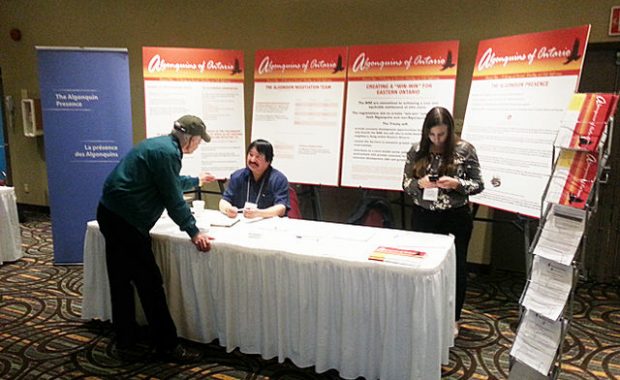PEMBROKE – On April 10 at the Algonquin Land Claims information forum held in Pembroke, the Gazette was privileged to hold exclusive interviews with each of the following parties: Brian Cranem, principal negotiator for the Ontario government; Ron Doering, principal negotiator for the Government of Canada; and Alan Pratt, legal counsel for Algonquin interests in the negotiation process. Following are quoted comments, made by the interviewees, to the subjects raised.
Regarding the question of timing of this land claim – why now?
Crane: “It’s been a piece of unfinished business for at least 20 years. The claim was recognized by both governments in the early 1990’s and there have been negotiations since the 1990’s until today. In the last five years the Algonquins have focused their efforts, have come together internally, and we’ve had a very good relationship with them. The reason we’re at this table is because the Algonquins never had a treaty with the government. They’re the only group in Ontario of that type, the only group in the whole province which doesn’t have a treaty. So, that’s why we have such a broad scale type of negotiation. It’s a feature of history. People forgot the Algonquins. The Algonquins made petitions to the Crown for hundreds of years. It was only in the 1980’s that the government focused on this, finally agreeing that it should be accepted.”
“Don’t expect solutions overnight especially so in Eastern Ontario, where the land is Crown land, used very heavily for recreational purposes. So there are many interests in crown land. We have to take all those interests into account as best we can. The federal government is a full party to these negotiations, but because of the distribution of powers between Canada and Ontario, Ontario has the lead in matters relating to land and resources.”
Doering: “Ontario and Canada agreed that in light of history and in light of the law, the time is right to begin to negotiate. Also, as you may or may not know, the Canadian courts since the mid 1970’s have been making it clear, that where people didn’t have a treaty there was an obligation to protect the honour of the Crown, an obligation to sit down and negotiate (outstanding) treaties. [Since then] they’ve negotiated 26 treaties and this is one of the outstanding ones. One of the things that is unique about this one is that this involves provincial Crown lands. The courts told us we have to do this and it is the right thing to do. I am not aware that there is any other case where the detail has been so transparent; everything is ready, been readily available for everyone.”
Pratt: “The process of accepting this claim was not straightforward because it’s based on aboriginal rights, aboriginal title. So the governments had to look at the information that the Algonquins submitted, whether the Algonquin rights existed in the first place, or had been affected by other things such as other treaties, laws, etc. Legal developments, since the 1990’s, have only worked to strengthen the claim. It’s very, very clear that this is a valid claim; there are rights there that need to be negotiated.
“The Algonquins were the only ones who did not have a treaty. It’s a bit of a mystery why the Algonquins were left out because they were petitioning the government starting in 1772 and every 10 years or so thereafter, saying: “You have to do something! Our land is being taken! People are moving in!’ Something I’ve been saying to a lot of people who are upset or complaining today is: ʽWell, about 150 years ago it would have been a lot simpler to settle this claim, before the million non-native people moved into the area.’”
Regarding a common complaint charging that the process and the negotiations were conducted behind closed doors
Crane: “We’ve heard that message. But any negotiation takes place behind closed doors and especially when you are dealing with real estate. You can’t go and hold a community meeting and say you would like to sell out all this land to the Algonquins, or transfer to the Algonquins. First thing [you] know property has gone up in value and there is speculation. You can’t really negotiate this type of thing in public. But what we can do is allow for a reasonable process of consultation where you can get input from people. A lot of people have said that you didn’t [recognize] that I have a right-of-way across this particular piece of property, and perhaps we didn’t. Perhaps we’ve overlooked that. So we will make the adjustments and we will provide the legal right of way. We’re not trying to deprive people of their rights. We’re trying to make sure that we have people’s rights [protected]. If people say we don’t want to have any Algonquin land selections on our lake, well, we say that’s part of the arrangement. We’re going to give the Algonquins part of the land on this lake. That’s part of making a treaty. If you got a good reason for saying [there] shouldn’t be any Algonquin land on [my] lake, we’ll look at the reason, but just saying you don’t want them there is not appropriate in our minds. A lot of people don’t realize that the planning regulations and bylaws will continue. This isn’t going to be reserve land. This is going to be ordinary lands like you might have with your house [or] cottage.”
Story continues in the April 17, 2013 issue of The Valley Gazette.
